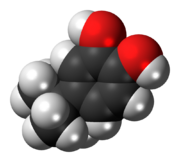Chemistry:4-tert-Butylcatechol
From HandWiki
Revision as of 09:26, 26 May 2022 by imported>Jworkorg (url)

| |

| |
| Names | |
|---|---|
| Preferred IUPAC name
4-tert-Butylbenzene-1,2-diol | |
| Other names
para-tert-Butylcatechol
p-tert-Butylcatechol t-Butyl catechol p-t-Butylpyrocatechol p-tert-Butylpyrocatechol 4-t-Butylpyrocatechol 4-tert-Butylpyrocatechol | |
| Identifiers | |
3D model (JSmol)
|
|
| Abbreviations | TBC |
| ChEMBL | |
| ChemSpider | |
PubChem CID
|
|
| UNII | |
| |
| |
| Properties | |
| C10H14O2 | |
| Molar mass | 166.217 g/mol |
| Melting point | 50 °C |
| Boiling point | 285 °C |
Except where otherwise noted, data are given for materials in their standard state (at 25 °C [77 °F], 100 kPa). | |
| Infobox references | |
Tracking categories (test):
4-tert-Butylcatechol (TBC) is an organic chemical compound which is a derivative of catechol.[1] TBC is available in the form of a solid crystal flake[2] and 85% solution in methanol[3] or water.[4]
Uses
It is added as a stabilizer and polymerisation inhibitor to butadiene, styrene,[5] vinyl acetate, divinylbenzene[6] and other reactive monomer streams.[7]
TBC is also used as a stabilizer in the manufacture of polyurethane foam.[8] It also can be used as an antioxidant for synthetic rubber, polymers and oil derivatives.[7] It can be used as purification agent for aminoformate catalysts.[citation needed]
It is 25 times better than hydroquinone at 60 °C for polymerization inhibitory effect.[citation needed]
See also
References
- ↑ "Nomination Background: p-tert butylcatechol". April 1993. https://ntp.niehs.nih.gov/ntp/htdocs/chem_background/exsumpdf/butylcatechol_508.pdf.
- ↑ "TBC OPTIMA 100% FLAKES" (in en). https://www.solvay.com/en/product/tbc-optima-100-flakes.
- ↑ "TBC OPTIMA 85% METHANOL" (in en). https://www.solvay.com/en/product/tbc-optima-85-methanol.
- ↑ "TBC OPTIMA 85% WATER" (in en). https://www.solvay.com/en/product/tbc-optima-85-water.
- ↑ "Styrene Safe Handling and Storage Guide". https://amsty.com/images/pdf/styrene-safe-handling-guide-english.pdf.
- ↑ "DuPont Divinylbenzene (TM) Technical Manual". 2020-03-01. https://www.dupont.com/content/dam/dupont/amer/us/en/water-solutions/public/documents/en/45-D02015-en.pdf.
- ↑ 7.0 7.1 "4-Tertiary Butylcatechol | Business & Products" (in en). https://www.dic-global.com/en/products/alkylphenol/tbc/.
- ↑ "tert-Butylcatechol (TBC)" (in en-US). https://www.silverfernchemical.com/products/tert-butylcatechol-tbc/.
Sources
- US Patent 4061545:Polymerization inhibitor for vinyl aromatic compounds
- US Patent 3046472: Substituted Catechol Antioxidants
 |

